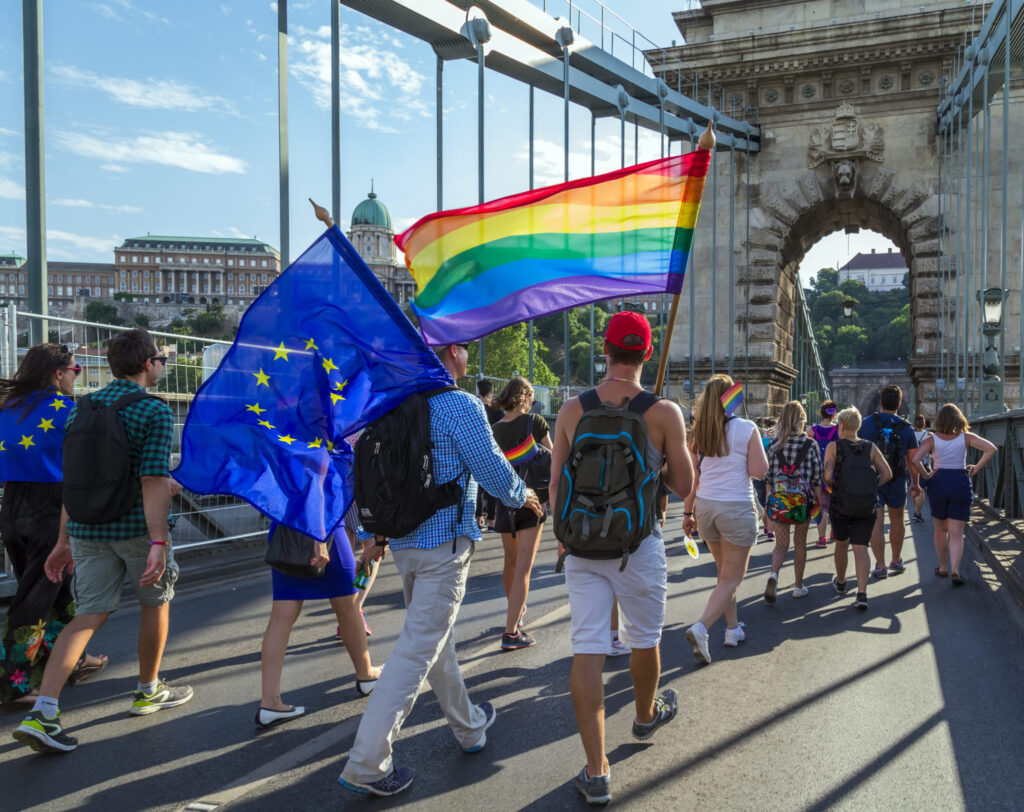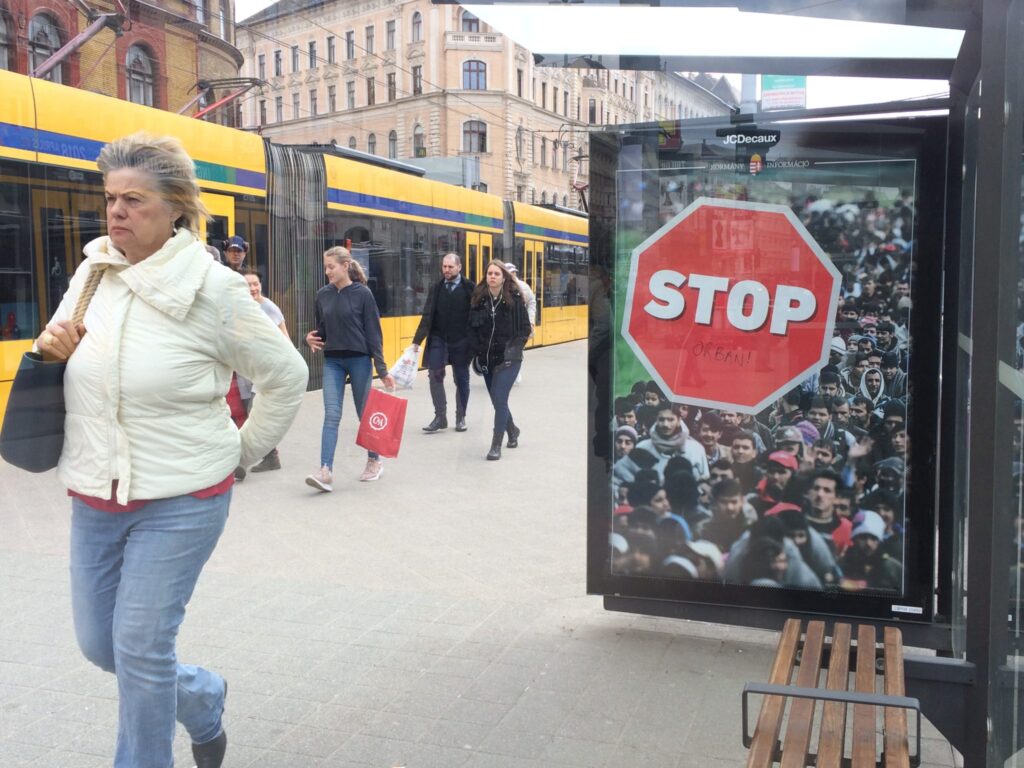Máté Hegedűs was walking on Deák tér, one of the busiest areas of Budapest recently. His long hair, his earring, flower-patterned shirt and colorful shoes made him stand out from the crowd. Someone suddenly shouted at him ’look, there goes a gay guy!’. He actually used a very vulgar expression.
’I don’t mind being stared at and I actually felt good about the fact that he noticed that I looked different’ say the 22-year-old Hegedűs, who identifies as a gay man and works in a program that helps LGBTQ kids accept their homosexuality.
He did not mind the harsh words, either. ’I have learned to deal with these already,’ he says, adding that these incidents are rare in Budapest streets.
However, he thinks that it might be the sign of something worrying: that some people are feeling emboldened by the more and more homophobic rhetoric coming from the Hungarian government and the governing party, Fidesz. ’Just like with migrants, the fearmongering and hate campaign makes people cruel to each other and makes them feel like they have the right to do certain things’ Hegedűs says.
Fearmongering as a political tool
In the past few years there have been more and more examples of members of the Hungarian governing party publicly expressing homophobic views. The media empire supporting the governing party also spreads that kind of rhetoric. This is making members of the LGBTQ community worried, some of whom are afraid that they might be the next target of the Hungarian government’s hate campaign.
Most of them mention the government-funded anti-migration fearmongering campaign that has been going on for four years now and are afraid that they are the next target. The government of Hungary spends a lot of money on hate campaigns: according to research by Atlatszo, the Orban government spent €216 million on fearmongering propaganda between 2010 and 2018.
The latest example of the anti-LGBT sentiment comes from early August when Coca-Cola put up billboards and citylight posters across the country showing happy same-sex couples, with the slogan ’Love is love.’

One of Coca-Cola’s “Love is Love” ads. Photo source: FB Coca Cola Hungary
István Boldog, a member of the Hungarian Parliament from the Fidesz party soon called for a boycott of Coca Cola, saying that he would not drink any of their products until the company removed their ’provocative’ ads.
Website pestisracok.hu, uncritically supporting the government, published a story titled ’The homosexual lobby is attacking Budapest.’ The text drew parallels between homosexuality and pedophilia.
For a few days Coca-Cola and its ads were one of the hottest topics in Hungary, and posting a photo of drinking a coke on social media became a political statement. ’When I first saw the ads, I was very happy’ says Hegedűs. However, he felt disappointed when he noticed that the posters had abusive messages scribbled on them.
Coca-Cola removed the ads and replaced them with different ones, featuring a rainbow-colored Coke bottle within days, and claimed that the change had been planned all along.
This time, however, the government itself did not stand behind the critics: an official statement said that everyone is free to drink whatever they want in Hungary. It is worth noting that Coca-Cola is a ’strategic partner’ of the government of Hungary. Prime minister Viktor Orban himself attended the opening of the companies new plant in 2012 in Dunaharaszti. At the time he said for his generation ’to drink a Coke means that you feel like you belong to the West.’
Homosexuality as a disease
However, there were several other instances where top members of the government, including Orban himself, expressed homophobic views.
András Léderer, a human rights lawyer in Budapest remembers the first time he noticed the pattern and started to worry. It was in 2015, not long after he publicly came out as gay in an online opinion piece. Viktor Orban held a press conference in Debrecen that happened to take place on May 17, on the International Day Against Homophobia, Transphobia and Biphobia.
A journalist asked Orban about homophobia and an apparently surprised Orban replied that he was grateful for the Hungarian LGBTQ community for ’not being as provocative’ as their community in the West. He also mentioned that currently there is a ’balance between’ the two groups of people (homosexual and heterosexual), and stressed twice that there is a legal difference in Hungary between marriage and civil unions. Orban’s reply made Léderer feel like Orban does not consider the LGBTQ community a part of the Hungarian nation.
Since then, many prominent Fidesz politicians spoke homophobic words. Speaker of the House László Köver said this May that same-sex couples demanding the right to adopt children are no different from pedophiles and he also said that ’normal’ homosexuals try to adapt to society and do not fight for equality.
Earlier this year one of the state-run public service channels, M5, dedicated a show to conversion therapy, spreading the view that homosexuality was a disease and that it was only the ’gay lobby’ trying to convince young people that this was not a sickness and incurable.
In June Fidesz MP István Boldog demanded a ban on Pride.
“Testing how far they can go”
When Máté Hegedűs, the young campaigner heard some of these, he was shocked and immediately started to think whether he should simply move out of Hungary to a more friendly place. In the end he decided to stay and see whether he can change life for his community in his home country.
András Léderer says that this homophobic rhetoric is worrying because there are many young LGBTQ people, especially in the Hungarian countryside, who have nobody to talk to about how they feel. Many of these young people have been emailing him since his coming out, asking for his advice and describing how terrible and isolated they feel.
’They watch with their parents Kövér saying such things on the evening news and they are thinking: how could I come out to my parents if this is what everyone is seeing? They are wondering whether their parents also think that they are not normal.’
’This gives a huge amount of anxiety to those young people who are realizing only now that they are attracted to their own gender’ Léderer adds.

22th Budapest Pride Parade, 2017. Photo: Shutterstock
However, he thinks that Hungarian society itself is much more tolerant towards the LGBT community than it was twenty years ago. He doubts that the Hungarian governing party itself is deeply homophobic – he thinks the Orban government is just testing how far it can go, how much resistance it will receive from the LGBT community.
’For most of these politicians this is nothing else but an empty campaign tool, which in fact ends up ruining people’s lives.’ He thinks here is a difference between the homophobic rhetoric of the Polish and the Hungarian governments: in Poland there is a deep conviction behind the anti-LGBT political slogans.
’This is a strange Eastern European trend that populist parties are enlisting homophobia besides their anti-migration rhetoric. There are several prominent LGBT politicians among their Western allies. What the Hungarian and Polish politicians are saying about this topic, has been considered uncivilized in the West for thirty years at least,’ he says.
Lakner: ‘We have seen this before’
Political scientist Zoltán Lakner says that the jury is still out: we are still not sure whether the Hungarian government is deliberately waging another hate campaign and has found a new target after migrants. ’However, I feel like that we have seen this before. This is how they start such a campaign. They are testing the waters. We are at the beginning stages of such a campaign.’

One of anti-migrant posters in Hungary
He stresses that Hungary is very much different from, for example, the US when it comes to what politicians say. If an American lawmaker says something, it most probably does not reflect the party line but his or her own views. In Hungary, the governing party is centralized and if more and more politicians say the same thing, it is most probably coordinated and planned. Also this is why Lakner thinks it is worrying that Fidesz politicians and state-funded media more and more often equate homosexuality with pedophilia.
Lakner also thinks that the Orban government’s strengthening homophobic propaganda fits into its larger narrative about being the ’protector’ of ’Christian values’ and Europe.
’They are always updating their political product. But if you put the ’enemies’ presented by the Hungarian government in the past 10 year together, you will see that there is a narrative coherence. And anything that can be sold as protecting the Christian lifestyle fits here, both the anti-migration and homophobic propaganda.’
According to Lakner, only about one sixth of Hungarians go to church regularly, which means that many of them do not know Christian dogma in detail. But they can be easily convinced that the LGBT community somehow lives in a different way from them, that they are strange. ’And this gives them a chance to feel normal, and people like to feel so’ Lakner says.
Even though there are more and more instances of Fidesz politicians expressing homophobic views, Lakner points out that no concrete steps have been taken to take away the rights of LGBT people. They cannot marry but can enter into civil unions. However, it seems further than ever for same-sex couples to be able to officially adopt a child.
’I don’t see this matter progressing, and I hope the government won’t create an atmosphere in the country where many in the LGBT community will be happy just with not losing any of their rights.’
Hungarian journalist, works with the investigative outlet Atlatszo. She won the Junior Prima Prize in 2012. Former Fulbright/Humphrey Fellow. Based in Budapest.






